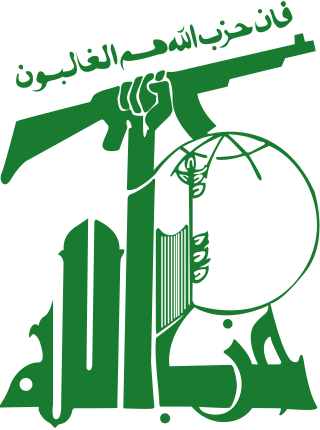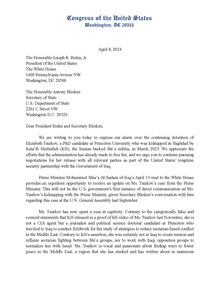
Hezbollah is a Lebanese Shia Islamist political party and militant group, led since 1992 by its Secretary-General Hassan Nasrallah. Hezbollah's paramilitary wing is the Jihad Council, and its political wing is the Loyalty to the Resistance Bloc party in the Lebanese Parliament. Its armed strength is assessed to be equivalent to that of a medium-sized army.

A human shield is a non-combatant who either volunteers or is forced to shield a legitimate military target in order to deter the enemy from attacking it.

The Popular Resistance Committees is a coalition of a number of armed Palestinian groups opposed to what they regard as the conciliatory approach of the Palestinian Authority and Fatah towards Israel.
Members of the Iraqi insurgency began taking foreign hostages in Iraq beginning in April 2004. Since then, in a dramatic instance of Islamist kidnapping they have taken captive more than 200 foreigners and thousands of Iraqis; among them, dozens of hostages were killed and others rescued or freed. In 2004, executions of captives were often filmed, and many were beheaded. However, the number of the recorded killings decreased significantly. Many hostages remain missing with no clue as to their whereabouts. The United States Department of State Hostage Working Group was organized by the U.S. Embassy, Baghdad, in the summer of 2004 to monitor foreign hostages in Iraq.
The term militia in contemporary Iraq refers to armed groups that fight on behalf of or as part of the Iraqi government, the Mahdi Army and Badr Organization being two of the biggest. Many predate the overthrow of Saddam Hussein, but some have emerged since, such as the Facilities Protection Service. The 2003 invasion of Iraq by United States-led forces undermined the internal order in the country and brought about, among other things, the establishment of several pro-Iranian militias affiliated with the Islamic Revolutionary Guard Corps's Quds Force. The militias were set up with the purpose of driving the U.S. and Coalition forces out of Iraq and establishing Iranian involvement in the country. Prominent among the militias are Asa'ib Ahl al-Haq, Kata'ib Hezbollah and Harakat al-Nujaba.
Hezbollah has a Foreign Relations Unit and maintains relations with a number of foreign countries and entities. These are particularly Shia states, but also Sunni groups like those affiliated with the Palestinian cause; and the group is also suggested to have operations outside the Middle East in places such as Latin America and North Korea.

Since the Iranian Revolution in 1979, the Islamic Republic of Iran has been embroiled in tense relations with the U.S. and its allies. Following the hostage crisis, both countries severed relations. Since then, both countries have been involved in numerous direct confrontations, diplomatic incidents, and proxy wars throughout the Middle East, which has caused the tense nature of the relationship between the two to be called an 'international crisis'. Both countries have often accused each other of breaking international law on several occasions. The U.S. has often accused Iran of sponsoring terrorism and of illegally maintaining a nuclear program, as well as using strong rhetoric against Israel, of which Iran has questioned its legitimacy and its right to exist while supporting Hamas, an antizionist terrorist group in the Gaza Strip. Meanwhile, Iran has often accused the U.S. of human rights violations and of meddling in their affairs, especially within the Iranian Democracy Movement.
Since the Iranian Revolution in 1979, the government of the Islamic Republic of Iran has been accused by several countries of training, financing, and providing weapons and safe havens for non-state militant actors, such as Hezbollah in Lebanon, Hamas in Gaza, and other Palestinian groups such as the Islamic Jihad (IJ) and the Popular Front for the Liberation of Palestine (PFLP). These groups are designated terrorist groups by a number of countries and international bodies such as the EU, UN, and NATO; however, Iran considers such groups to be "national liberation movements" with a right to self-defense against Israeli military occupation. These proxies are used by Iran across the Middle East and Europe to foment instability, expand the scope of the Islamic Revolution, and carry out terrorist attacks against Western targets in the regions. Its special operations unit, the Quds Force, is known to provide arms, training, and financial support to militias and political movements across the Middle East, including Bahrain, Iraq, Lebanon, Palestine, Syria, and Yemen.
Special Groups (SGs) is a designation given by the United States military to the cell-based Shi'a paramilitary organizations operating within Iraq, According to the United States these groups are funded, trained, and armed by the Iranian Quds Force, part of the Islamic Revolutionary Guard Corps (IRGC).

Kata'ib Hezbollah or the Hezbollah Brigades, is a radical Iraqi Shiite paramilitary group which is a part of the Iraqi Popular Mobilization Forces (PMF), staffing the 45th, 46th, and 47th Brigades. During the Iraq War (2003–11), the group fought against Coalition forces. It has been active in the War in Iraq (2013–2017) and the Syrian civil war (2011–present). The group was commanded by Abu Mahdi al-Muhandis until he was killed in a US drone attack in 2020. Thereafter, he was replaced by Abdul Aziz al-Muhammadawi, as the new leader of the PMF. KH seeks to establish an Iran-aligned government in Iraq, expel American forces from the country, and advance the regional and international interests of Iran in Iraq and the region. The group is responsible for killing hundreds of U.S. soldiers and takes a central part in carrying out attacks against U.S. targets in Iraq and acts as part of the Axis of Resistance. Kata'ib Hezbollah has received extensive training, funding, logistic support, weapons, and intelligence from the Quds Force of Iran's Islamic Revolutionary Guard Corps (IRGC).
The Axis of Resistance is an informal Iranian-led political and military coalition in West Asia and North Africa. It most notably includes the Islamic Resistance in Iraq, the Syrian government, the Lebanese political party and militant group Hezbollah, the Yemeni political and military organization Ansar Allah, and a variety of Palestinian militant groups. The various actions of members of this axis reflect their domestic interests while serving the broader goal of complicating Israel's attacks and imposing a cost on the United States to support Israel. The axis became the main fighters against ISIS, after the group took over Syria and Iraq in 2014.

The Iran–Israel proxy conflict, also known as the Iran–Israel proxy war or Iran–Israel Cold War, is an ongoing proxy conflict between Iran and Israel. In the Israeli–Lebanese conflict, Iran has supported Lebanese Shia militias, most notably Hezbollah. In the Israeli-Palestinian conflict, Iran has backed Palestinian groups such as Hamas. Israel has supported Iranian rebels, such as the People's Mujahedin of Iran, conducted airstrikes against Iranian allies in Syria and assassinated Iranian nuclear scientists. In 2018 Israeli forces directly attacked Iranian forces in Syria.

The Iranian intervention in Iraq has its roots in the post-2003 invasion of Iraq by the United States and its allies, when the infrastructure of the Iraqi armed forces, as well as intelligence, were disbanded in a process called "de-Ba'athification" which allowed militias with close ties to Tehran to join the newly reconstituted army.

The Popular Mobilization Forces (PMF), also known as the People's Mobilization Committee (PMC) and the Popular Mobilization Units (PMU) is an Iraqi state-sponsored umbrella organization composed of approximately 67 different armed factions, with around 230,000 fighters that are mostly Shia Muslim groups, but also include Sunni Muslim, Christian, and Yazidi groups. The Popular Mobilization Units as a group was formed in 2014 and have fought in nearly every major battle against ISIL. Many of its main militias, in particular the Shias, trace their origins to the "Special Groups", Iranian-sponsored Shi'ite groups which previously fought an insurgency against the United States and the Coalition forces, as well as a sectarian conflict against Sunni Jihadist and Ba'athist insurgents. It has been called the new Iraqi Republican Guard after it was fully reorganized in early 2018 by its then–Commander in Chief Haider al-Abadi, Prime Minister of Iraq from 2014 to 2018, who issued "regulations to adapt the situation of the Popular Mobilization fighters".
The Iran–Israel conflict during the Syrian civil war refers to the Iranian–Israeli standoff in and around Syria during the Syrian conflict. With increasing Iranian involvement in Syria from 2011 onwards, the conflict shifted from a proxy war into a direct confrontation by early 2018.
On 29 December 2019, the United States conducted airstrikes against Kata'ib Hezbollah's weapons depots and command centers in Iraq and Syria, reportedly killing at least 25 militiamen and wounding 55 more. The U.S. Department of Defense said the operation was in retaliation for repeated attacks on Iraqi military bases hosting Operation Inherent Resolve (OIR) coalition forces, particularly the 27 December 2019 attack on a Kirkuk airbase that left an American civilian contractor dead. Kata'ib Hezbollah, an extremist Shi'ite militia funded by Iran, denied any responsibility for the attacks.

On February 25, 2021, the United States military carried out an airstrike on a site which it believed to have been occupied by Iranian-backed Iraqi militias operating from across the border in eastern Syria. The unilateral operation was in retaliation for multiple rocket attacks against U.S. forces in Iraq ten days prior and was the first known offensive military operation carried out under U.S. president Joe Biden.

Starting on 17 October 2023, and in response to United States support for Israel in the Israel–Hamas war, Iran-backed militias initiated a coordinated series of more than 170 attacks on U.S. military bases and assets in Syria, Iraq, and Jordan. These attacks resulted in injuries to dozens of U.S. service members. In retaliation, the U.S. has launched multiple counterattacks, resulting in the death of over 30 militants including a senior commander of the Nujaba Movement, Mushtaq Talib al-Saidi. In February 2024, following U.S. airstrikes in Iraq and Syria, militia attacks against U.S. forces were halted.

The Islamic Resistance in Iraq is a network of Iranian-backed Shia Islamist insurgent groups in Iraq. It is an umbrella term or generic name used by these groups when carrying out attacks against American and allied forces in the region.
On 2 February 2024, the United States Air Force launched a series of airstrikes targeting Iran's Revolutionary Guards and Iran-backed militia groups located in Iraq and Syria. The attack was launched in retaliation against a drone strike carried out by the Islamic Resistance in Iraq targeting US troops in Jordan the week before, which killed three U.S. troops.











